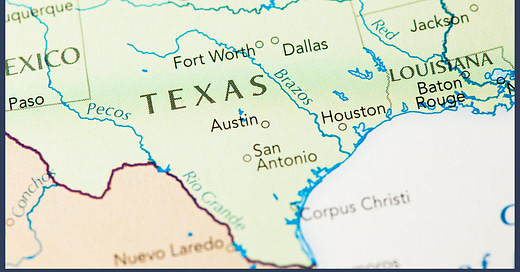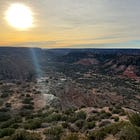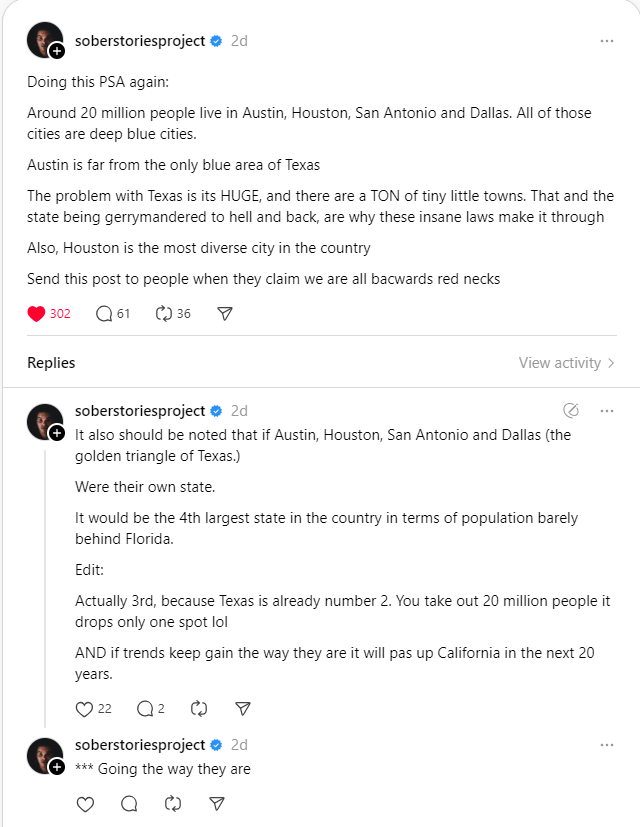Texas Is Massive
And people don't leave. Both facts explain so much.
It’s one thing to know Texas is big.
It’s another thing to experience how big Texas is.
In elementary school, we’re all told Texas is the second-largest state in the nation. I had been to Texas a few times as a teenager, so I was familiar with a few specific locations. But it wasn’t until we decided to travel across Texas during multiple vacations that I finally understood the vastness of the state.
We probably realized it the first time my husband Jeff and I traveled to New Orleans. As we drove from Houston to Louisiana on I-10, we noticed the large exit numbers the closer we got to the border. Before we left Texas and entered a new state, we passed Exit 880. It was the highest exit number we had ever seen in our entire life.
I’ve lived in a lot of states, and it is pretty common for state residents to not travel from from their home of origin. That is no judgment on individual character; it is a fact humans like to be comfortable and for many people, comfort can be found at home. As a result, it wasn’t uncommon to find people in Texas who had not traveled far out of the region. Our kids were always shocked when they discovered how many of their friends had never left the state, especially since they have never stayed in a single state for a single calendar year their entire lives.1
But unlike living in Indiana, where a trip home to Michigan has always been around three hours, a three-hour drive in Texas would take us to Austin or San Antonio. It took four hours for us to get to Dallas. And it would take us two full days to travel west across the state before we would finally cross the New Mexico border. And during the process we would leave palm trees and the Gulf Coast to drive through the Hill Country, then deserts, then mountains before finally leaving the state. Driving across Texas helped us see that the state is more than one thing as we traveled past cities and small towns and ranches and farmland, many occupied by residents who rarely, if ever, left their local comfort zone.
Texas is the stickiest nation in the United States. Around 82% of native-born Texans live in the state for their entire lives. Some may leave for college or short-term work opportunities, but most will return “home” to live out the rest of their days.
But Texas is also so large, it’s not hard to not leave. A person could grow up in a small down in West Texas, go to college, and then get a job in nearly any kind of industry in any of Texas’ five major cities. If people want to visit the ocean, they only have to travel to the Gulf Coast. If they want to go to wineries, they can visit the Hill Country. If they desire hiking in canyons, they can explore Palo Duro or Big Bend National Park. And if that is all Texans know, it is hard for them to understand life for anyone who does not live in such a massive and culturally and ecologically diverse state.
It also helps explain why Texans, who really do have a belief that Texas is a kind of special utopia, have a difficult time understanding the issues that plague the rest of us. If you never have to leave the state to experience new things and meet new people, it makes it hard to understand the struggles outside of the state.
It also makes it difficult for Texans to understand what is happening in their own state. When we traveled across west Texas we would see miles upon miles of windmills, solar fields, and houses outfitted with renewable energy. Windmill blades turned next to fully operational oil dirks. In Houston, I would listen to those involved in oil and gas lament the state of the industry while I silently wondered if they knew how much renewable energy was being produced six hundred miles away in the west Texas desert.
I have a hard time listening to people from Dallas and Houston as they talk about issues at the Texas/Mexico border. They live hundreds of miles away from the bordertowns struggling to respond to challenges along the border. And instead of offering solutions to their fellow Texans, they speak about fear of undocumented immigrants coming into their cities hundreds of miles away and causing harm. Does immigration impact the economics of the entire state? Yes, eventually. But most people are pretty well insulated from the immediate problems that need to be solved.
When we experienced massive flooding events while living in Houston, it was easy to forget the many flooding events we had witnessed as Midwesterners. After all, when I was fourteen I traveled across the Midwest when the Mississippi flooded its banks for months, the water nearly reaching the Arch in St. Louis. The water lasted far longer than the Harvey floods that covered half of Houston, and probably caused similar property damage and long-term economic impacts. But when you are experiencing such massive destruction around it, and you know it won’t be the last time, it is hard to think about destructive flooding events in other places.
Our Houston friends often had a hard time believing we dealt with hot weather when we traveled north to visit family. They believed our months of hot, humid weather were somehow unique to the south, without considering that summer is summer, no matter where you live. For our friends who would eventually leave the south during the summer, they would text with comments about how they had been hoping the weather would be cooler while they were traveling. And I would laugh at their assumptions.
Texans often have a difficult time seeing how the laws and regulations in one state might affect another because it takes so long to leave Texas, unless you are fortunate enough to live close to the New Mexico, Oklahoma, Arkansas, or Louisiana border. I once had a conversation with a coworker who was lamenting the gun laws in Illinois and gave the standard “see, gun laws don’t help Chicago” argument. I then tried to explain to him that the city of Chicago borders on two other states. Indiana and Wisconsin have significantly less restrictive gun laws. It isn’t hard for someone in Chicago to leave the state, buy guns, and bring them back to the city. It happens all the time. I left the co-worker speechless. He didn’t know how to respond to the reality that other states are far more interdependent than Texas. A functioning system of Federalism greatly helps a state like Texas, but also makes it difficult for Texans to see their responsibility to other states as participants in Federalism.
Texas’ size is one of its greatest strengths and greatest liabilities. The size gives its citizens diversity and opportunities unavailable to most other people around the country. But it also prevents citizens from seeing the good work being done in other places around the country. It prevents further innovation with new ideas and solutions from the outside. And occasionally, the desire for automomy can be deadly, as many Texans discovered in the winter of 2021.
But we can’t allow them to sit on that automony, because whether they like it or not, Texans need the rest of us and we need them. Understanding this reality helps to highlight this recent post on Threads:
There are many things that can help us better understand our Texan friends, but understanding how the size of the state impacts so much else would be a good place to start. Our democracy may depend on it.
Support my writing
While most of my work here is free for all subscribers, it is still a labor of love that I fit into the few hours I have when I am not teaching or being an attentive wife and mom. If you would like to support my writing but do not want to commit to being a paid subscriber, please consider a one-time donation.
You can also support me by ordering my book or books from my favorite book lists at my Bookshop.org affiliate page.
Check out my RedBubble store for related merchandise.
If you want to be a regular supporter, you can upgrade your subscription from free to paid and get occasional content only for paid subscribers.
And thank you for supporting my journey 💗
To be fair, their grandparents live in Michigan and we lived in Indiana when they were born. It was a given they were going to go to Michigan at least once each calendar year. But we’ve always made sure to travel outside of whichever state we live in every year. What can I say? We like diversity.








When I moved to Michigan many years ago I was at first surprised at how many people I met hadn't traveled outside of the state (or at most to nearby Ontario). But then I discovered the state's beauty up north where so many friends and acquaintances had cottages or second homes, the lovely Lake Michigan shore towns which reminded me of New England, and the serenity of the UP. That didn't stop me from travelling extensively around the US and Western Europe, but I could understand people being satisfied with the beaches, boating, camping, etc. here. Me, I fell in love with Michigan's beauty crossing the Mackinac Bridge at sunset after only a few weeks living in East Lansing....
Having driven across Texas two years in a row, I have a real appreciation for what you say here.